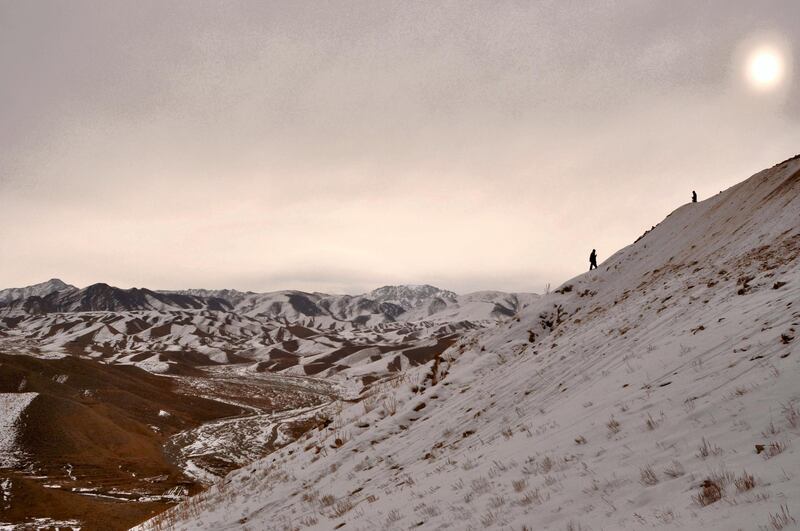When Jamil Jan Kochai was 12, he visited his family in Afghanistan. Having grown up in the United States, it was an exhilarating trip. "Everything – the mountains and the cobras and the markets and the gunmen and the land itself – seemed so beautiful and so frightening all at once," he says, recalling the experience 14 years on. But there was one strange, evocative moment that remained particularly vivid for years afterwards: when the vicious family guard dog Budabash escaped, and Kochai and his cousins left their compound in rural Logar to try and find him.
"You know, that dog hated me," Kochai remembers. "And Budabash not accepting me made me think of myself as a real outsider coming into this village. So I went out with my cousins to be part of the gang, just another Afghan on a trail.
"But I became overwhelmed by the adventure. There was this paralysing sense of fear I hadn't felt in Logar before. My parents didn't know where I was, neither did anyone in authority. It was just me and my cousins looking for this dog," he explains.
He turned back and sat under a mulberry tree, contemplating his young life against a backdrop of fields, dusty roads and a setting sun. It was an image that stayed in his mind well into his adult years. So when it came to writing his debut novel, 99 Nights in Logar, there was only one place to start: with a 12-year-old Afghan-American boy, a missing dog and a set of cousins determined to find him. Except, of course, his protagonist Marwand doesn't turn back. Instead, he embarks on a 99-night quest to find Budabash.
“It starts off as an adventure tale,” explains Kochai. “But from there the novel deepens and expands, and incorporates stories within stories so I could look at the political, historical and social layers of this village in Afghanistan. It’s a coming-of-age story for Marwand, too, just like going to Logar was a formative experience for me.”
His titular nod to the collection of folk tales One Thousand and One Nights is no coincidence. His 99 Nights in Logar has a magical, almost fable-like feel, as Kochai employs countless storytelling techniques – one moment it's a witty exploration of devil-may-care youth, the next a heartbreaking family tale. "I hit a wall in the narrative about 100 pages in," Kochai admits. "So I picked up that copy of One Thousand and One Nights that everyone has, but I hadn't actually read. And when I did, I couldn't believe how these ancient tales are actually so fresh and brave and alive. I was totally inspired and I thought, if one of my characters wants to tell a story, I will let them do it and see where it takes me. After that, the novel really got going for me."

99 Nights in Logar retains the joy, poignancy and wonder of oral storytelling that is the basis of One Thousand and One Nights and an important tradition in countries such as Afghanistan. Kochai speaks at length about his grandmother, who has never read a book but knows enough trauma to be able to tell a story. The Soviets carried out a massacre in Logar in the early 1980s and, although not enough has been written about that time, Kochai knows it won't be forgotten. "Thousands of stories are told," he says. "They are whispered in crumbling rooms late at night while the entire family is gathered to bear witness.
So I had to keep convincing myself that I was doing these beautiful, touching stories justice. I just wish people could hear them as they are originally told." In that vein, there's a passage towards the end of the book written in Pashto, in which Marwand is finally told the story of his uncle, whose death was something of a mystery throughout the novel. It is untranslated, yet is still a hugely powerful moment in the novel.
"It's a really precious story for our family and I can't truly capture it in English, it would have been a disservice somehow," says Kochai. "English is such a powerful language in Afghanistan. Pashto has been under assault for such a long time and just for a few pages I wanted that power dynamic to be reversed, for this precious part of our identities to be celebrated."
It may be an unexpected denouement to the book, but 99 Nights in Logar is all the better for it. Kochai challenges his readers to reassess what they think about Afghanistan. The narrator of the book ponders one of the most memorable lines, amazed by a nearby war carrying on in the mountains at night. "It was odd how a few miles could turn bombs into lullabies," Marwand says to himself.
Kochai wanted to illustrate the horrific and dramatic dimensions of the war. “I didn’t want to wash over what it’s like to live in Afghanistan,” he says. “But when I’ve been there I’ve been most moved by how the war affects you in ways you wouldn’t expect. It’s not just shootings and bombings and death.
"It's knowing a certain road belongs to the Taliban so you can't go down that direction, and the way the war infects language and jokes and the countryside; how unrelenting violence affects masculinity. It's the intricate details that are the most powerful."
Sadly, after regular visits to the country, Kochai hasn't felt able to return to his village in Logar of late. A car bomb attack there in January killed eight members of the Afghan security forces. "It's a little bit tragic for me and my father that a place that has become so precious is not really somewhere we can visit right now," he says. "But we are hopeful that circumstances might change. It does seem like the country might be heading towards peace."
In the meantime, 99 Nights in Logar is a refreshing portrait of modern Afghanistan that successfully celebrates its "frightening beauty", as Kochai puts it, without ever being sentimental.







